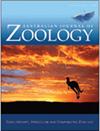SIR疾病在大种群中的持续性:亨德拉病毒在澳大利亚黑狐中的流行
IF 1
4区 生物学
Q3 ZOOLOGY
引用次数: 0
摘要
摘要了解新出现的病毒如何在蝙蝠种群中持续存在,是了解病毒从宿主宿主向外溢宿主传播过程的一个基本步骤。亨德拉病毒自1994年以来在澳大利亚东部的马和人身上引起了致命的感染,它从其天然宿主狐蝠(俗称飞狐)中溢出。有人认为,亨德拉病毒在蝙蝠种群中的维持机制可能与它们的超种群结构有关。在这里,我们研究了由小于临界群落规模的黑狐(P. alecto)群落组成的元种群是否可以维持亨德拉病毒。通过使用Gillespie算法,随机数学模型被用来模拟一个循环,在这个循环中,病毒的灭绝和重新定植在一个群中的单个群体中重复进行。考虑到估计的飞狐迁移率,模拟结果表明,重新殖民发生的频率高于灭绝,这表明感染不会在元种群中灭绝。因此,这项研究表明,在澳大利亚的许多狐蝠种群中,亨德拉病毒的短暂流行可以支持该病毒在超种群水平上的长期存在。本文章由计算机程序翻译,如有差异,请以英文原文为准。
The persistence of a SIR disease in a metapopulation: Hendra virus epidemics in Australian black flying foxes (Pteropus alecto)
Abstract. Understanding how emerging viruses persist in bat populations is a fundamental step to understand the processes by which viruses are transmitted from reservoir hosts to spillover hosts. Hendra virus, which has caused fatal infections in horses and humans in eastern Australia since 1994, spills over from its natural reservoir hosts, Pteropus bats (colloquially known as flying foxes). It has been suggested that the Hendra virus maintenance mechanism in the bat populations might be implicated with their metapopulation structure. Here, we examine whether a metapopulation consisting of black flying fox (P. alecto) colonies that are smaller than the critical community size can maintain the Hendra virus. By using the Gillespie algorithm, stochastic mathematical models were used to simulate a cycle, in which viral extinction and recolonisation were repeated in a single colony within a metapopulation. Given estimated flying fox immigration rates, the simulation results showed that recolonisation occurred more frequently than extinction, which indicated that infection would not go extinct in the metapopulation. Consequently, this study suggests that a collection of transient epidemics of Hendra virus in numerous colonies of flying foxes in Australia can support the long-term persistence of the virus at the metapopulation level.
求助全文
通过发布文献求助,成功后即可免费获取论文全文。
去求助
来源期刊
CiteScore
2.40
自引率
0.00%
发文量
12
审稿时长
>12 weeks
期刊介绍:
Australian Journal of Zoology is an international journal publishing contributions on evolutionary, molecular and comparative zoology. The journal focuses on Australasian fauna but also includes high-quality research from any region that has broader practical or theoretical relevance or that demonstrates a conceptual advance to any aspect of zoology. Subject areas include, but are not limited to: anatomy, physiology, molecular biology, genetics, reproductive biology, developmental biology, parasitology, morphology, behaviour, ecology, zoogeography, systematics and evolution.
Australian Journal of Zoology is a valuable resource for professional zoologists, research scientists, resource managers, environmental consultants, students and amateurs interested in any aspect of the scientific study of animals.
Australian Journal of Zoology is published with the endorsement of the Commonwealth Scientific and Industrial Research Organisation (CSIRO) and the Australian Academy of Science.

 求助内容:
求助内容: 应助结果提醒方式:
应助结果提醒方式:


